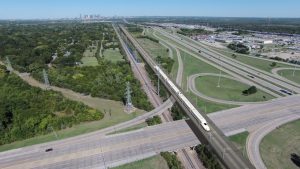 Texas Central signed a USD 1.6 billion contract with Kiewit and its Mass Electric subsidiary to install the core electrical systems for the Texas high-speed rail project.
Texas Central signed a USD 1.6 billion contract with Kiewit and its Mass Electric subsidiary to install the core electrical systems for the Texas high-speed rail project.
The contract includes the installation of core electrical systems including critical safety and systems elements such as traction power, signalling and communications equipment to enable the trains to operate safely and ensure the tracks and operators communicate with one another and with network operations.
The core systems that will be installed are a key component of the N700S Shinkansen technology being deployed for the Texas Central Railroad. Texas Central is using an integrated approach ensuring all parts of construction and operations are seamlessly integrated both for safety and for efficient and cost-effective operations. Using a complete systems approach creates unparalleled safety performance with the trains, infrastructure and supporting high-speed rail technology designed and engineered to work together as an integrated unit.
“Kiewit and Mass Electric are national leaders in installing complex and large-scale electric systems and have long track records of delivering high-quality rail systems safely and effectively. Signing this contract is the next step in making the Texas Central Railroad the first high-speed rail system to be implemented in the United States,” Carlos Aguilar, the CEO of Texas Central Railroad said.
The Texas high-speed rail project consists of the construction of a 320 km line linking Dallas and Houston in less than 90 minutes.
The system replicates the proven Japanese Tokaido Shinkansen high-speed rail system, as operated by the Central Japan Railway Company (JRC).
The project will create an estimated 17,000 direct jobs during the six years of construction, over 20,000 supply chain jobs and more than 1,400 direct permanent jobs when the train is fully operational. The Texas Central project will use USD 7.3 billion of materials from US companies across 37 states. Over the next 25 years, this project will have a direct cumulative economic impact of USD 36 billion.
Share on:



